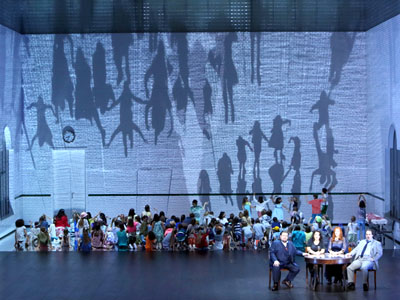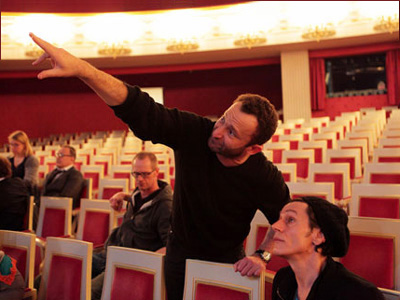
By ANDREW POWELL
Published: November 22, 2013
MUNICH — Everything looked ready for its close-up, Mr. DeMille, at Die Frau ohne Schatten last night (Nov. 21). Down to the last falcon feather. When the cameras roll for a Dec. 1 live stream of this new Bavarian State Opera production, the copious blue-greens, red and purple accents, photo-realistic surfaces, world-of-wildlife accessories, and yes, even Krzysztof Warlikowski’s dramaturgy, should block, pan and zoom handsomely, variedly. From a fixed seat in the National Theater, though, visual stimulus was scarce once the viewer tired of the staging’s massed white tiles or wood panels at a certain distance, and its falconine helmets.
Ironically the theater building itself was ostensive hero yesterday. Exactly fifty years have passed since it reopened, with this same epic opera, after a 1943 pummeling by American and British bombers, much recalled this season in dozens of black-and-white promotional images and a fat new book.
The festive evening also marked Day One of public opera duty for the company’s new Generalmusikdirektor Kirill Petrenko and, remarkably, the first complete performance in Munich of the grandest score (1915) of local lad Richard Strauss. The music triumphed.
Warlikowski shifts Hugo von Hofmannsthal’s story of regeneration to a 1940s sanatorium — cure facility à la Thomas Mann, not madhouse. The Kaiser and Kaiserin (Johan Botha and Adrianne Pieczonka) are customers. Barak and wife (Wolfgang Koch and Elena Pankratova) have traded dyeing work for careers in spa-based healthcare, specifically in the establishment’s busy laundry. Prone to hearing voices, self-identifying as a gazelle, and troubled with visions of her husband turned to stone, the Kaiserin has submitted to a drugged-out regimen of extended lounging, accompanied by her fawning, pawing, animated gay Amme (Deborah Polaski).
Trips between the earthly and spiritual planes of the Hofmannsthal scheme are reduced to walks and elevator rides around a wing of the sanatorium. But Warlikowski compensates. Pretty raptors — more of them than a hunting Kaiser could need, and more than would ever get along in the wild — enliven scenes with deft sudden neck-rotations. Keikobad is enacted as a bent stick-insect of a man on a cane, a silent Max Schreck in need of chiropractic. Video projections provide aqueous segues in the action, and clips from Resnais’s L’année dernière à Marienbad throw at least an opening light on the imperial couple; Warlikowski fails to close it out.
Miraculously Petrenko mastered pit-and-stage balances on this first night, something his predecessor seldom did in seven years with the Bavarian State Orchestra. (Guest conductors typically get them wrong, too. Ivor Bolton succeeds, but he has worked here for two decades and favors more temperate music.) These, and restrained, beautifully intoned woodwind playing alone made the listening a pleasure. But the strings, besides, emitted wondrous silky shimmers we don’t often hear.
Then there was the singing, none of it forced or shrill. Pieczonka reveled in warm, glorious tones, from the agile passages of Act I to the trenchant, focused declamation of her trial. She had no need to milk Ich will nicht! because she had built up the scene so powerfully leading to it. Polaski made her character a credible close presence in the Kaiserin’s life, sustaining the director’s conception. She sang with impeccable control (at age 64) and let loose new energy in her final, bitter scene.
Botha had the notes, even if his pitch wavered here and there. Koch, in the shoes of Dietrich Fischer-Dieskau fifty years ago, furnished his role with a pleasing cantabile sound. In Act III’s Schweiget doch, ihr Stimmen! … Mir anvertraut, dass ich sie hege sequence, he wisely declined to push to match Pankratova’s volume. Without a home of her own in Warlikowski’s staging, the role of the Färberin is curbed dramatically. Pankratova made her considerable impact last night mostly through the music, painting words in detail, coyly in her early dialog with the Amme, and shaping vocal lines tellingly rather than coming on strong with her mighty instrument. Supporting roles were well taken. Vocal-ensemble and choral contributions had evidently been tightly rehearsed, although some lapses of coordination marred the last pages of the opera.
Realized with ideal balances and alert intonation, Strauss’s uncut music rose from the bottom under Petrenko, its counterpoint resilient and its parts properly weighted. Not a single ugly note sounded all evening, vocal or instrumental. No one audibly tired. Oddly for a premiere here, no one booed at curtain, not even at the director and his team. And the five hours flew by.
Photo © Wilfried Hösl
Related posts:
Petrenko Preps Strauss Epic
Portraits For a Theater
Christie Revisits Médée
Petrenko’s Sharper Boris
Die Fledermaus Returns

Portraits For a Theater
Sunday, October 13th, 2013By ANDREW POWELL
Published: October 13, 2013
MUNICH — Next Wednesday (Oct. 16) new portraits go on display in Bavarian State Opera’s lobby. Twenty-one new portraits.
Astrid Varnay, Dietrich Fischer-Dieskau, Kurt Moll, Brigitte Fassbaender, Lucia Popp, Edita Gruberová, René Kollo, Hildegard Behrens and Waltraud Meier are among the worthy singing subjects, company troopers all.
But theatergoers expecting traditional oils on canvas in pretty frames may be in for a shock.
The new dauerhaft pieces embrace painting, drawing, tapestry, photography, hot wax, and at least one video requiring its own flat-panel display, to be hung in a hall that once serenely separated our electronic world from the madness on stage.
To create space in the company’s 114-year-old portrait collection, fifteen tired canvasses recently disappeared into das Lager des Theatermuseums, a.k.a. deep storage, leaving bare walls.
Safe, at least for now, are well-varnished depictions of such epoch-defining Munich musicians as Heinrich Vogl and Therese Thoma, Wagner’s first Loge (1869) and first Sieglinde (1870).
But 21 new faces? The growth spurt — involving the same number of visual artists and two years’ gestation — is intended to correct a lull. Apparently only conductor Wolfgang Sawallisch and impresario Peter Jonas have been added to the collection since the 1960s.
And it serves another purpose. Fifty years have passed since Bavarian State Opera resumed operations at Munich’s National Theater, on Nov. 21, 1963, long after the house was cratered by Allied bombs. Rebuilding cost: 60 million Deutschmarks, or thereabouts.
Friends of the company (Freunde des Nationaltheaters München e.V.) wanted to seize the occasion to acknowledge the work of singers in each subsequent decade.
The result is portrait commissions that are a little front-loaded. Hermann Prey, for instance, who sang leading roles starting in the 1960s, is honored alongside salad-green contributors such as Klaus Florian Vogt, who began in the 2000s and may or may not prove to be a singer of lasting artistry.
At any rate, the collection is made current, and presumably hipper, by this large initiative.
Other subjects of the commissions include Munich favorites Margaret Price, Júlia Várady, Wolfgang Brendel and the still-active, though wobbly, Peter Seiffert.
An odd choice is Fritz Wunderlich, the honey-toned Mozart tenor who died young. He went through the company’s apprentice program before the house reopened, but then bolted for a career contract in rival Vienna.
Today’s singers in the lineup, besides Vogt, are Anja Harteros, Diana Damrau, Jonas Kaufmann, Christian Gerhaher and Wolfgang Koch.
Administrative enthusiasm and the sheer scale of the effort have led to at least one creaky assignment, its outcome already made public, that for Damrau. The soprano gets photography-based treatment that manages to degrade and marginalize her without giving the viewer a sense of who she is.
With luck, this will be the qualitative exception.
Bronze busts of the company’s music directors, meanwhile, comprise another facet of the theater’s art. At present this series is complete through Zubin Mehta, who left in 2006.
As it happens, a new Generalmusikdirektor, Kirill Petrenko, took over last month on a five-year contract, and so the just-departed Kent Nagano will likely soon be commemorated in three-dimensional metal.
Print and online material related to the company’s 2013–14 season, not incidentally, showcases black-and-white photographs of the bombed-out house as well as 1963 crowds after the reopening.
Soberly its slogan taps Nietzsche: Wie man wird, was man ist.
How One Becomes What One Is — a smooth segue to a bleaker side of the retrospective. Official research has at last begun into correspondence between the Nazi Party and two former Bavarian State Opera GMDs, Richard Strauss (tenure 1894–1896) and Clemens Krauss (1937–1944).
Petrenko, looking forward, gives his first concert next month, a freebie with Nina Stemme, Kaufmann, and the virtuosic Bavarian State Orchestra.
A few days later, on the anniversary itself, he leads a new staging of Die Frau ohne Schatten, the opera that reopened the National Theater under GMD Joseph Keilberth one day before Kennedy was shot.
Some of Petrenko’s initial work will be streamed at www.staatsoper.de/tv: Die Frau ohne Schatten (directed by Krzysztof Warlikowski) on Dec. 1; La clemenza di Tito (Jan Bosse) on Feb. 15, 2014; and Die Soldaten (Andreas Kriegenburg) on May 31.
Here’s hoping the new portraits, in the aggregate, adequately reflect the virtues of this remarkable institution!
Photo © Wilfried Hösl
Related posts:
In Your Face, Astrid
Petrenko Preps Strauss Epic
Flitting Thru Prokofiev
Ettinger Drives Aida
Petrenko to Extend in Munich
Tags:Anja Harteros, Astrid Varnay, Bavarian State Opera, Bavarian State Orchestra, Bayerische Staatsoper, Bayerisches Staatsorchester, Brigitte Fassbaender, Christian Gerhaher, Clemens Krauss, Commentary, Diana Damrau, Die Frau ohne Schatten, Dietrich Fischer-Dieskau, Edita Gruberová, Fritz Wunderlich, Heinrich Vogl, Hermann Prey, Hildegard Behrens, Joseph Keilberth, Júlia Várady, Kaufmann, Kent Nagano, Kirill Petrenko, Klaus Florian Vogt, Kurt Moll, Lucia Popp, Margaret Price, München, Munich, National Theater, Nationaltheater, News, Nina Stemme, Peter Jonas, Peter Seiffert, René Kollo, Richard Strauss, Therese Vogl, Waltraud Meier, Wolfgang Brendel, Wolfgang Koch, Wolfgang Sawallisch, Zubin Mehta
Posted in Munich Times | Comments Closed